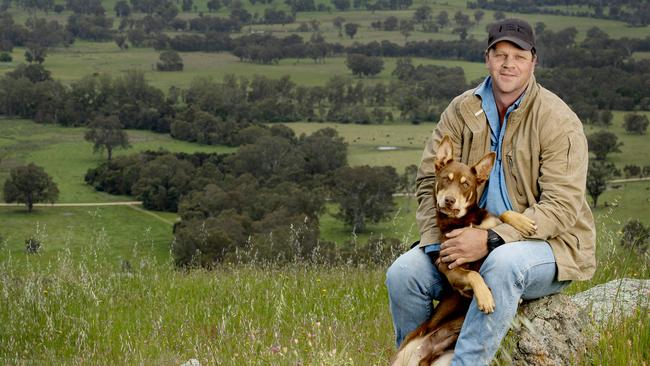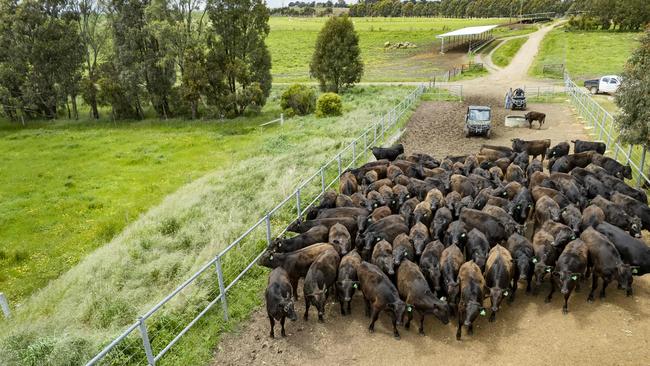The Falls Pastoral: Tim Bennett from Longwood East on running Wagyu cattle
Tim Bennett from Longwood East runs one of the most successful Wagyu operations in the country. See the innovations he uses to make money.

Low and slow is a technique most commonly applied to cooking, with a focus on patience yielding the most tender, delicious results.
It’s a principle farm manager Tim Bennett is applying during his tenure at The Falls Pastoral at Longwood East, near Euroa in North East Victoria, as he focuses on refining the property’s Wagyu operation on behalf of the Ball family.
A Wagyu herd of about 600 breeders, and a number of Angus and F1 cattle are run across the 1200ha property, which includes sprawling heritage gardens at the family homestead, complete with a spring-fed waterfall.

At the base of a granite turret sits a small 50-year-old vineyard producing 4000 to 5000 bottles of shiraz per vintage, which Tim hopes to some day turn into a sustainable, biodynamic wine operation.
“People throw around the word sustainable, but the family has a big focus on doing things in a proper way,” Tim said.
But it’s the Wagyu operation, and the idea of laying down fat on the animals slowly and gradually, which has kept Tim busy since first starting his role as farm manager in 2020.
With a background in dairying in Tasmania, Tim studied a Bachelor of Science at the University of Queensland, before returning to his island home to help with the family dairy farm, and also spend some time working as an agronomist.
SLOW AND SURE
The Falls full-blood Wagyu herd is derived from a selection of Tajima cows from Australia’s revered Blackmore herd.
A number of Angus and F1 cattle are also run across the property, with the Angus in particular used for embryo transfers.
“Going forward, we’ve made the decision to phase those animals out, and build the best full-blood herd we can,” Tim said.
“Maybe it’s my ex-dairy background, but there are huge gains to be made with smaller paddocks, more water, and really focusing on using pasture, which hasn’t necessarily been done in the past. I’m confident numbers can lift. But I’m also mindful too when you have a high-value herd in tough seasons, you can’t go and offload stock.”
Calving across the herd is split evenly into autumn and spring drops “for continuity of supply”, with the Sandhills method used to control and reduce scours in newborn calves.
“It’s only been 12 months, but what I’ve seen so far has been pretty balanced,” Tim said.
“Wagyu are renowned for being susceptible to scours, and losses in calves. I’ve implemented the Sandhills method from the US, and I’ve had zero cases of scours.”
The method involves putting all calving cattle in the one paddock, and eventually removing non-calving cattle to separate paddocks.
It’s just one of many new ideas implemented by Tim since he started at The Falls about 12 months ago.
“(another) major change is shifting away from synthetic chemical fertiliser, to a product called LawrieCo from South Australia, that’s more of a natural fertiliser aimed at increasing soil biology and soil carbon,” Tim said.
All calves are weaned at about eight-months-old, before being moved to a backgrounding rotation for 150 to 200 days where they are trained to use the feed bunk.
“Because Wagyu are slower growing, the whole idea with the rations from when they are weaned to killed, is a high-energy, low-protein diet that lays down the fat slowly,” Tim said.
“It’s about 800g of growth a day from the day they’re born, until killed. It’s formulated for the Wagyu … if you put them on an Angus ration, you’d see about 1.5-2kg weight gain. Wagyu are inefficient, but the gains are there in the end.”
Wagyu cattle are then moved to the Elders Killara Feedlot, at Quirindi, NSW, where they are on feed for about 450 days until they weigh in at about 800kg.
The cattle are then processed at Greenmountain abattoir in Queensland.
The Falls Wagyu in the past has been sold into China.
GROUND UP
SOIL type across the property is a granite-based sandy loam, with annual rainfall of about 900mm.
Tim said by November this year, the rain gauge had already measured about 800mm.
“It’s a genuinely temperate climate, with good rainfall, good soil, and water,” Tim said.
“But the farm does vary, almost like a microclimate up the top, and the temperature can change by four to five degrees. It can be raining up there, and not down here.”
While rainfall is always welcome, Tim said the wet winter made getting nutrients on to crops difficult.
“I couldn’t get on to it because it was so wet, and now I’m seeing a bit of rust. But I look at it as being part of establishing a high-performing pasture in the long run,” he said.
Summer crops are sown as part of a pasture-renovation program, with about 110ha of wheat this year, along with some brassica crops.
About 1000 trees a year are planted across the property, all propagated in the garden.
Another measure implemented by Tim is individual DNA testing and tagging of every animal on farm.
“It’s important to get accurate records,” Tim said.
“Going forward, we want to benchmark the carcasses, and start finetuning the herd and identifying those cows that are producing high performing progeny, and culling those that aren’t.”
Tim is giving cows “a second chance” if they don’t fall pregnant while he is tightening up the calving patterns and moving the spring calving back six weeks to start calving around the beginning of August, with the autumn calvers back to start calving at the beginning of March.
“Our key traits are growth and marbling. You’ve got to have a good solid cow herd,” he said.
“With most cattle, it’s 70 per cent feed and 30 per cent breed, but it’s the opposite with Wagyu. Genetics is everything.”
A number of bulls are used in the AI program.
“There's a lot of work that goes into matching cows with bulls,” Tim said.
PAYDAY
Not surprisingly, one of the biggest expenses this season is fertiliser.
Feed requirements for the Wagyu herd tend to take up a large portion of the property’s expenses.
“Those steers that are backgrounded for a couple of hundred days, the rations are about $270 a tonne, and feeding is happening 365 days a year,” Tim said.
“But this coming autumn it’s certainly fertiliser, it’s getting out of control.”
Supply issues have also affected The Falls market for their Wagyu overseas, namely China.
Tim said most of the meat produced by The Falls is exported.
“Earlier this year, there were cattle which should have been killed. But China put bans on a couple of abattoirs, and we just had to keep feeding (the cattle) for three or four months longer,” Tim said.
“But with prices, we’ve secured some really good contracts now.”
Regardless of the challenges facing producers in the short term, Tim feels confident it’s a great time to be in agriculture.
“The season here has been excellent. I think the way prices are going, it’s great for farmers,” Tim said.
“I guess the downside to that is the price of beef, and the more expensive it gets, the more easily replaced it can be by other proteins like chicken. It’s a Catch 22.
“But whether it’s beef, dairy or cropping, it’s a great time to be in agriculture.”





